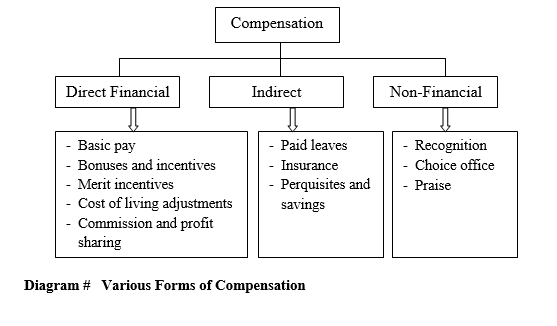Compensation includes two things:
1) Direct financial compensations which is typically made in cashable form that reflect direct work related compensation such as base pay, wages and salaries, merit increases or increments, bonuses-festival or incentive, commissions;

2) Indirect financial compensation or benefits that consists of all forms of compensation beyond direct financial compensation such as (a) paid leave-vacations, holidays, sick leave, other leave; (b) supplementary pay-shift pay, non-productive bonuses; (c) insurance-life insurance, health insurance, sickness and accident insurance, long-term disability insurance; (d) retirement and savings -defined benefit pension, defined contribution pension; (e) legally required benefits-provident fund, social security, preparatory leave for retirement, medicare, workers compensation; (f) other benefits -stock ownership etc.
3) Non-financial rewards like praise, self-esteem and recognition that affect employee motivation, productivity and satisfaction, not included in remuneration. This also includes other forms of rewards and returns that employee may receive such as promotions, recognition for outstanding work, feeling of accomplishment, choice office location and like.
All these elements constitute an organization’s reward system or compensation.

 Follow
Follow